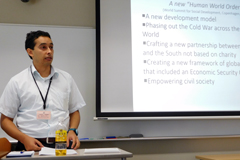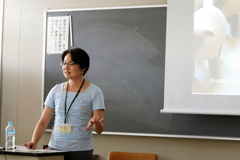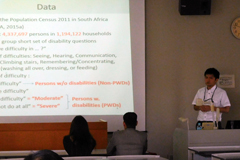JICA-RI Researchers Present Results of Research on Human Development and Capability Approach
2016.09.29
With a theme of "Capability and Diversity in a Global Society," the annual conference of the Human Development and Capability Association (HDCA) was held at Hitotsubashi University in Tokyo, Sept. 1 to 3, 2016. JICA-RI researchers Oscar A. Gomez, Yukimi Shimoda and Kengo Igei reported on their research results.
HDCA is a global community of academics and practitioners who promote research in the interconnected areas of human development and capability. The event attracted wide participation, including scholars, policy makers, practitioners and students from dozens of countries.
Leading scholars, including Nobel Prize winner Amartya Kumar Sen of Harvard University, gave keynote lectures, discussing various issues from the perspective of the capability approach, which has been employed to evaluate well-being in the context of human development, as an alternative to economic indicators such as GDP per capita.

JICA-RI Research Fellow Oscar A. Gomez gives a presentation
Gomez chaired a session on "Human Rights and Human Security" and presented his analysis under the title "Climbing the same mountain: Understanding advances in human rights and human security ideas in global governance." Following previous presentations on human security and crises, and human security and global justice, this year's topic aimed to revise the relations and division of labor between the human concepts — human development, human rights and human security. The papers in the panel suggested several ways in which the discussions about the human concepts are presently evolving, and offered ideas on how to steer thinking in fruitful and complementary directions and to reduce areas of unnecessary competition and misunderstanding.
In his paper, Gomez first discussed why it is worth using human security as a locus for putting together human concepts. He highlighted how security has become a central pillar of global governance, and thus stressed the significance of influencing the way security is framed through human security as a way to mainstream all human concepts.
Then, he used the example of the "Responsibility to Protect" doctrine (better known as R2P) to show one way in which human concepts can actually collide.He showed how R2P was conceived as the harmonic combination of human security and human rights ideas, combining a new understanding of sovereignty with the importance of the individual. However, overemphasis on coercive intervention despite its consequences, as in Libya in 2011, suggests that human rights principled support for intervention and human security attention to consequences are at odds with regard to implementation.
Gomez closed by suggesting that bringing the discussion back to a broader understanding of the human, as in human development, would be of help in resolving such disagreements. This would depend on at least three challenges that proponents of human development ideas would have to confront in the near future, namely: countering the shock-driven response to global threats, embracing a culture of prevention through development, and rethinking human development's raison d'être in a post-development world.
In a session on Business, Community and Society, Shimoda talked about the social-cultural influences of inclusive business on stakeholders in her presentation entitled "Diversification of Individual Choices through Business: A case study from the Kyrgyz Republic."
Based on her field study in Kyrgyzstan, especially around Lake Issyk-Kul, she reported that the women felt producers, who are integrated into an inclusive business model, came to gain motivation not only through family support and cash income (economic influence), but also through respect from husbands and the community, which resulted in fostering their self-esteem (socio-cultural influence). She pointed out that these two virtuous cycles of economic influence and socio-cultural influence have kept the business model going.

JICA-RI Research Fellow Yukimi Shimoda gives a presentation
Shimoda later commented that it was valuable to have comments on and questions about the business model and its sustainability from the participants. She also said the rich discussions that took place in the conference enhanced her knowledge about the human development and capability approach, which will help her research.
Igei chaired a session on "Disability and Poverty," and introduced the results from his research "Multidimensional Impacts of Disability on Poverty: Evidence from Large-scale Data in South Africa." He discussed challenges facing the analysis of disability and poverty, where a significant gap is observed between persons with and without disabilities in terms of multidimensional poverty such as income, education and employment.
He explained his dataset and empirical methods and gave a presentation showing that persons with disabilities are more multidimensionally deprived even after equalizing persons with disabilities and those without in factors related to poverty besides disability. Through analysis by subgroup, he also showed that the persons with disabilities more affected by disability are those with difficulties in intellectual functions and multiple difficulties, males aged 15 or above, Africans and coloureds, and residents in rural informal or tribal areas.

JICA-RI Research Assistant Kengo Igei gives a presentation
Igei later commented that he was impressed that there were three sessions in this conference focusing on disability issue other than his and that many scholars presented research related to disabilities, including some based on quantitative analysis. This reflects increased attention to disability issues in academic study on human development and capability, which inspired his future research.

事業事前評価表(地球規模課題対応国際科学技術協力(SATREPS)).国際協力機構 地球環境部 . 防災第一チーム. 1.案件名.国 名: フィリピン共和国.

事業事前評価表(地球規模課題対応国際科学技術協力(SATREPS)).国際協力機構 地球環境部 . 防災第一チーム. 1.案件名.国 名: フィリピン共和国.

事業事前評価表(地球規模課題対応国際科学技術協力(SATREPS)).国際協力機構 地球環境部 . 防災第一チーム. 1.案件名.国 名: フィリピン共和国.

事業事前評価表(地球規模課題対応国際科学技術協力(SATREPS)).国際協力機構 地球環境部 . 防災第一チーム. 1.案件名.国 名: フィリピン共和国.

事業事前評価表(地球規模課題対応国際科学技術協力(SATREPS)).国際協力機構 地球環境部 . 防災第一チーム. 1.案件名.国 名: フィリピン共和国.
scroll